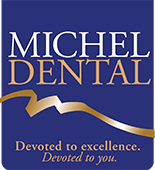Bad breath. To some, it’s a joke. To others, it’s an embarrassment or a health problem. Michael E. Michel DDS uncovers the causes of halitosis and delivers solutions.
Pay attention to bad breath
Don’t ignore chronic bad breath or halitosis. Aside from the social impact, halitosis could originate in oral and systemic health issues.
Dr. Michael E. Michel, Silver Lake dentist, looks for signs of tooth decay and other oral health problems. He also asks his patients about what concerns them. Sometimes a patient complains of stubborn bad breath that seems related to:
- aromatic foods such as onions and garlic that linger in the respiratory and GI tract
- cigarettes and chewing tobacco
- coffee
- fasting and poor hydration after strenuous exercise
In addition, sugary foods and starches such as bread and pastas encourage growth of oral bacteria. These active microbes give off Volatile Sulfur Compounds, or VSCs, the rotten egg odor associated with bad breath.
This kind of bad breath can be controlled with menu changes, smoking cessation and good hydration. But what about halitosis emanating from health-related issues?
Health problems lead to bad breath
Bad breath varies with chronic or acute health conditions. For instance, “brittle” or poorly controlled diabetes causes a fruity breath odor. Kidney failure makes breath smell like urine or ammonia. Mucous from sinusitis or even pneumonia emits a fetid smell when the individual exhales. People with GERD or gastroesophageal reflux may have smelly breath.
Plus, while cancer or Parkinson’s do not cause halitosis, some of the medications used to treat them do. Some psychiatric, hypertension and hayfever/allergy drugs do, too. Oxygen therapy leads to xerostomia, or dry mouth, in respiratory care patients.
What the solution to bad breath?
Your Silver Lake family dentist knows ways to alleviate halitosis. For common bad breath, simple habits help:
- Watch your diet. Limit aromatics such as onions, and reach for lower sugar items.
- Exercising or not, drinking plenty of water washes away food residues, stimulates saliva production and moisturizes oral tissues.
- Brush your teeth at least twice a day for a full 2 minutes as recommended by the American Dental Association. Floss daily. Good at-home hygiene controls plaque build-up. Remember to brush your tongue as its rough surface holds food particles and biofilm.
- See your Silver Lake/Topeka area family dentist every 6 months for an exam and hygienic cleaning. Dr. Michel will search out cavities and gum disease, and your hygienist will remove plaque and tartar that compromise gums and enamel and cause bad breath.
Dr. Michel sometimes suggests over the counter mouthwashes to eliminate simple bad breath. Prescription rinses with zinc chloride as an active ingredient combat oral bacteria and the sulfur compounds they emit. Your Silver Lake dentist treats decay and gum disease and refers patients to their primary care physicians if he thinks halitosis stems from a problem such as diabetes.
Don’t be ashamed
If you struggle with bad breath, contact the compassionate staff at Michel Dental. They will protect your privacy and get your health and breath on tract for a happier you.
